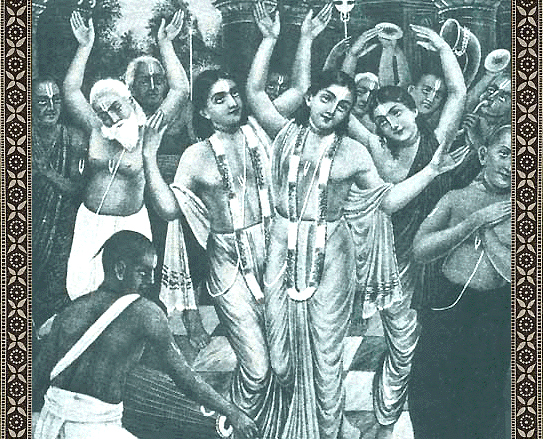
|
|
|
|
BY: SUN STAFF
 Feb 14, 2011 — CANADA (SUN) — An exploration of Sri Caitanya's instructions on renunciation. Continuing with our serial presentation on Lord Caitanya Mahaprabhu's instructions on renunciation, today we would like to begin at the end – the end of Bhagavad-gita, that is. The 18th and final chapter of Bhagavad-gita As It Is is entitled 'Conclusion -- The Perfection of Renunciation'. Here, Sri Krsna is summarizing His instructions to Arjuna ("abandon all varieties of religion and just surrender unto Me"), including an absolute definition of renunciation. Many of Mahaprabhu's instructions on renunciation found in Sri Caitanya-caritamrta have some connection to the sannyasa asrama. There is the pastime of the Lord renouncing married life and taking up sannyasa, the story of Chota Haridas, the example of phalgu-vairagi sannyasa in the person of Prakasananda Saraswati, and so many others. As a preface to discussing the many individual pastimes that instruct us on proper renunciation and the sannyasa asrama, let us first consider the very essential definition of renunciation given here in Bhagavad-gita As It Is, which is carried forward in all of Lord Caitanya's teachings on the matter. Chapter 18, Texts 1-12 "Arjuna said, O mighty-armed one, I wish to understand the purpose of renunciation [tyaga] and of the renounced order of life [sannyasa], O killer of the Kesi demon, Hrsikesa. The Supreme Lord said, To give up the results of all activities is called renunciation [tyaga] by the wise. And that state is called the renounced order of life [sannyasa] by great learned men. Some learned men declare that all kinds of fruitive activities should be given up, but there are yet other sages who maintain that acts of sacrifice, charity and penance should never be abandoned. O best of the Bharatas, hear from Me now about renunciation. O tiger among men, there are three kinds of renunciation declared in the scriptures. Acts of sacrifice, charity and penance are not to be given up but should be performed. Indeed, sacrifice, charity and penance purify even the great souls. All these activities should be performed without any expectation of result. They should be performed as a matter of duty, O son of Prtha. That is My final opinion. Prescribed duties should never be renounced. If, by illusion, one gives up his prescribed duties, such renunciation is said to be in the mode of ignorance. Anyone who gives up prescribed duties as troublesome, or out of fear, is said to be in the mode of passion. Such action never leads to the elevation of renunciation. But he who performs his prescribed duty only because it ought to be done, and renounces all attachment to the fruit--his renunciation is of the nature of goodness, O Arjuna. Those who are situated in the mode of goodness, who neither hate inauspicious work nor are attached to auspicious work, have no doubts about work. It is indeed impossible for an embodied being to give up all activities. Therefore it is said that he who renounces the fruits of action is one who has truly renounced. For one who is not renounced, the threefold fruits of action--desirable, undesirable and mixed--accrue after death. But those who are in the renounced order of life have no such results to suffer or enjoy."
These twelve verses from Bhagavad-gita touch upon many of the topics we have already mentioned in this series: yukta-vairagya, avoiding the asat, markata-vairagya, and nirbanda krishna sambandhe. All these principles are elaborately explained and demonstrated through Lord Caitanya's pastimes and preaching on renunciation. In his purport to Bhagavad-gita As It Is 18.4, Srila Prabhupada writes: "Although there are differences of opinion about renunciation, here the Supreme Personality of Godhead, Sri Krsna, gives His judgment, which should be taken as final. After all, the Vedas are different laws given by the Lord. Here the Lord is personally present, and His word should be taken as final. The Lord says that the process of renunciation should be considered in terms of the modes of material nature in which they are performed." And in this excerpt from his purport to Bhagavad-gita As It Is 18.10, he writes: "It is said in Bhagavad-gita that one can never give up work at any time. Therefore he who works for Krsna and does not enjoy the fruitive results, who offers everything to Krsna, is actually a renouncer. There are many members of the International Society for Krishna Consciousness who work very hard in their office or in the factory or some other place, and whatever they earn they give to the Society. Such highly elevated souls are actually sannyasis and are situated in the renounced order of life."
| |